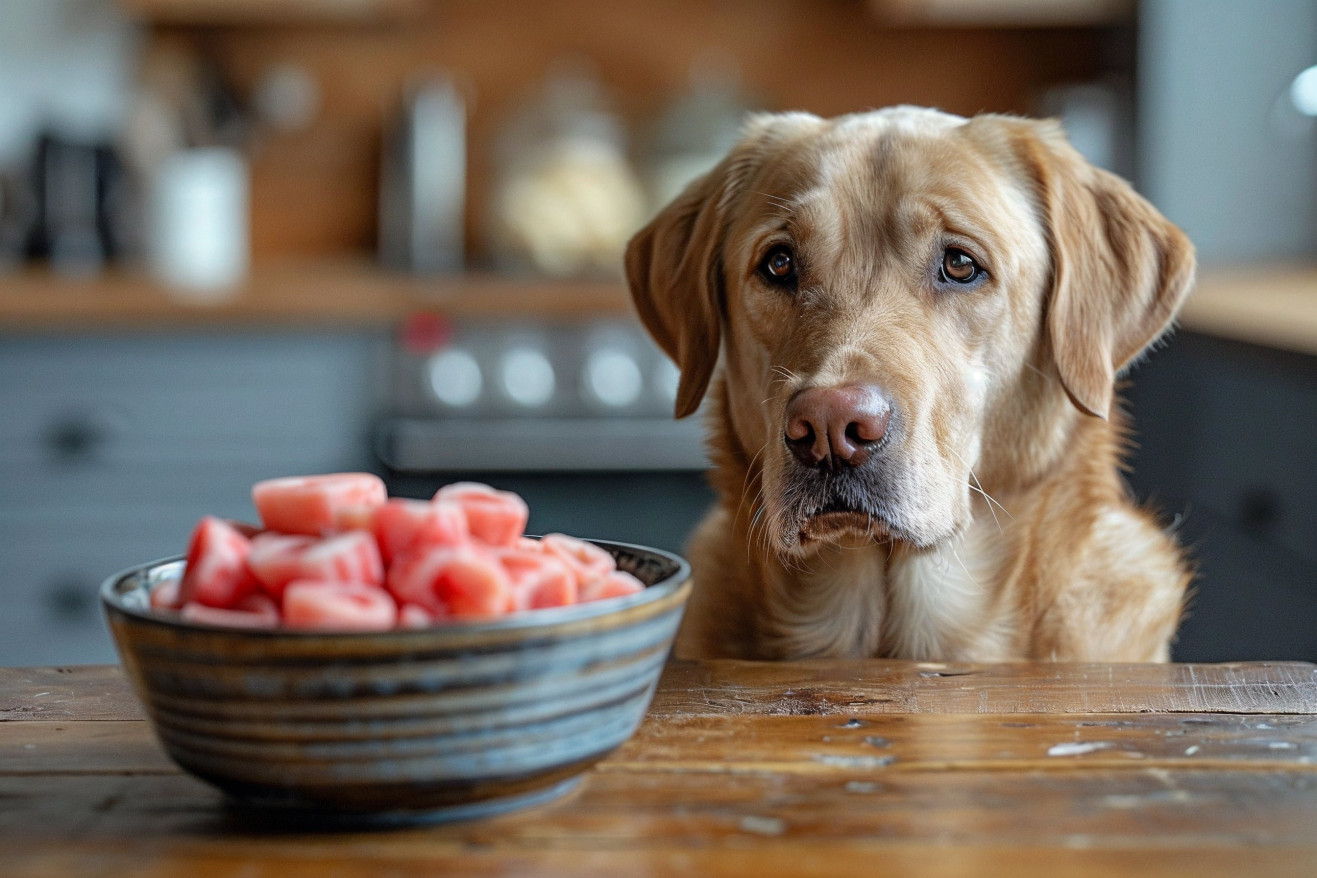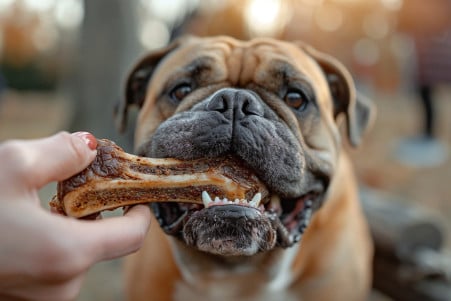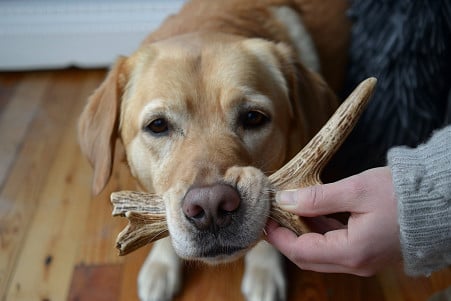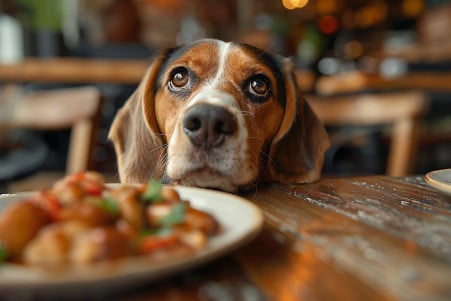Can Dogs Have Cow Hooves? The Risks and Benefits
3 June 2024 • Updated 3 June 2024

With the potential risks and benefits of cow hooves, a popular dog treat, many dog owners may be wondering if they are safe for their pets. In general, cow hooves for dogs are safe to give as long as they are given in moderation and under supervision. They can help clean your dog's teeth by removing plaque and tartar, but they can also be a choking hazard if they splinter. As a result, it's best to keep an eye on your dog while they are chewing on a hoof.
Studies from veterinary professionals, dog nutritionists, and pet product manufacturers shed light on the details of giving cow hooves to dogs. This article will look at research on the nutritional value of cow hooves, their impact on dental health, concerns about digestibility, how cow hooves are sourced, and the best ways to prepare cow hooves for dogs. It is intended to give you a complete picture of the potential risks and benefits of this popular chewing treat so you can decide whether or not it's a good choice for your dog.
Are cow hooves safe for dogs?
Assessing the Nutritional Value and Dental Risks of Cow Hooves
Cow hooves are made up almost entirely of keratin protein, which does not offer much in the way of nutritional benefits for dogs. However, their tough, hard nature can help scrape away plaque and tartar when dogs chew on them, due to the mechanical action of chewing, according to Natural Farm. Supporters claim that cow hooves can help improve dental health by gently massaging the gums, freshening the breath, and providing a workout for the jaw.
Some companies note that their cow hooves are made from the hooves of grass-fed, free-range cows and are treated to reduce odors and bacteria. Raw Dog Chews explains that their hooves are cut, dried, baked, and cooked to make them more palatable and to kill any bacteria that may be present.
Although cow hooves are not particularly nutritious, their abrasive texture may help improve dental health by removing plaque and tartar and exercising the jaw. Companies claim to take steps to ensure the safety and quality of their products. However, the hardness of the hooves may make them risky for dogs, potentially leading to tooth damage or digestive issues, which are covered in the next section.
Risk Assessment: Are Cow Hooves Safe for Dogs?
While cow hooves may help keep your dog's teeth clean, they also come with a number of risks. One of the biggest dangers is that the hooves will splinter into smaller pieces, which can lead to a number of health problems. According to Dogster, veterinarians frequently treat dogs with broken teeth, internal perforations, and intestinal blockages caused by chewing on cow hooves. Dogs who are aggressive chewers or who have dental problems are especially at risk, as they're more likely to break the hooves into smaller pieces.
Another risk is that the hooves will be contaminated with bacteria. According to The VetVoice, cow hooves that aren't handled or processed properly can be contaminated with bacteria. In addition, the hard, unyielding texture of cow hooves can cause dental problems, including abscesses and the need for tooth extractions.
Given the risks of broken teeth, internal perforations, intestinal blockages, and bacterial contamination, many dog owners may be hesitant to give their pets cow hooves. Fortunately, there are other options that can help keep your dog's teeth clean without the risks associated with cow hooves.
Safer Alternatives: Dental Chews and Treats
Although cow hooves may help with dental hygiene, there are safer alternatives that can help dogs maintain good oral health without the potential risks. Petfinder explains that deer or elk antlers are often marketed as a natural chewing option, but they can also lead to tooth fractures, choking, and intestinal blockages.
Veterinary professionals advise against hard chews like antlers, cow hooves, and bones and instead recommend dental chews and toys that have been approved by the Veterinary Oral Health Council (VOHC). According to AKC, VOHC-approved products have been tested for safety and effectiveness and can help reduce plaque and tartar without causing dental damage or digestive problems.
This article will cover safer alternatives to cow hooves, including VOHC-approved dental chews, edible treats, and other chew toys that can improve dental health without the same risks. The Continental Animal Wellness Center and NBC News offer lists of vet-recommended dental products that will help keep your dog's teeth clean while keeping them safe.
How to Spot and Prevent Dental Problems in Dogs
Dental disease is a common issue in dogs, and as many as 80% of dogs over the age of 3 have some form of periodontal disease. This makes it especially important to catch and prevent dental problems early on to ensure that your dog stays healthy.
According to VCA Animal Hospitals, common signs of dental pain in dogs include bad breath, discolored teeth, swollen or bleeding gums, difficulty eating, and pawing at the mouth. To prevent tartar buildup and gum inflammation, WHIMZEES recommends regular at-home dental care, including tooth brushing, dental chews and toys, and mouth checks.
Preventing dental disease and maintaining a dog's dental health through at-home care and professional veterinary cleanings is important for their overall health and can even prevent other health issues in the future. By taking a proactive approach, pet parents can help make sure their dogs don't suffer from the pain that comes with untreated dental disease.
Conclusion: How to Decide What's Best for Your Dog
While cow hooves can help clean your dog's teeth, they also pose several risks, including choking, dental fractures, and gastrointestinal blockages. Although some pet parents may feel comfortable giving their dogs cow hooves as long as they are closely supervised, there are other products that can help keep your dog's teeth clean without the same level of risk.
VOHC-approved dental chews, edible treats, and the right chew toys can all help remove plaque and tartar without the risk of dental fractures or gastrointestinal blockages. Keeping your dog's teeth clean is important for their overall health and can help prevent more serious issues in the future.
In the end, pet parents should consider the risks and benefits of cow hooves and other products and make a decision that's right for their dog, taking into account their dog's individual needs and preferences while prioritizing their safety and dental health.


